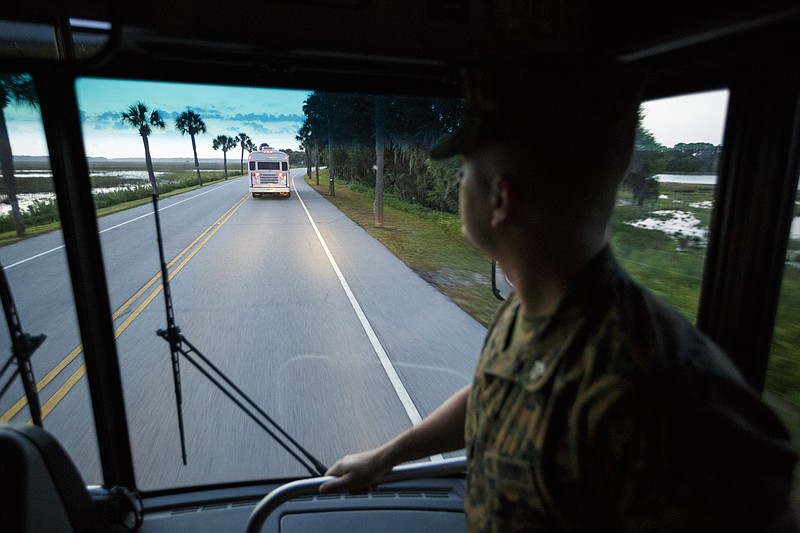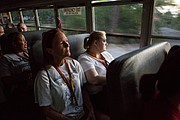PARRIS ISLAND BY THE NUMBERS
5,000 - recruits currently in training on the island19,000 - 23,000 - recruits pass through the island each year118,000 - 120,000 - active duty Marines across the United StatesSource: U.S. Marine Corps
Wednesday, 7:29 a.m.
As a light breeze rippled through Parris Island just after sunrise, Taylor Cloyd flailed in the sand pit, ankle-deep in grit, with the drill instructor screaming orders at her.
"HIGH KNEES!" Sgt. Josiah Makuch bellowed, sweat running down the back of his shaved head.
"High knees, aye sir," the ragged group in the pit yelled back, sand flying as they lifted their feet.
"I STILL CAN'T HEAR THE SOUND OF FREEDOM," Makuch howled. "SCREAM AYE SIR!"
"AYE SIR!"
Thousands of recruits for the U.S. Marine Corps have trained in this sand pit, fighting through a 13-week regimen at Parris Island, S.C., to become new Marines.
But Cloyd isn't a recruit.
She's a high school teacher, and spends most weeks teaching U.S. history at Heritage High School in Ringgold, Ga.
But not this week.
This week, Makuch put Cloyd and about 80 other educators from across the Southeast through the wringer as part of a workshop designed to give teachers, principals, career counselors and administrators a window into how new recruits are molded into Marines at Parris Island. The four-day expedition began Tuesday and will culminate today with a graduation ceremony for a new class of Marines.
Most of the educators invited to the workshop are in positions where they could encourage students to join or to avoid the military, and in a time when fewer people have family members in the service, the Marines hope the personal connections forged during the workshop will help bring in more recruits.
Wednesday, 9:04 a.m.
Gayle Gragg, a graduation coach at two high schools near Shelbyville, shook her head after surviving a tirade from Makuch.
"At 58 years old, maybe I should have stayed home," she said through a laugh.
Wednesday, 11:01 a.m.
After five hours on Parris Island, Cloyd was beginning to feel less like a teacher and more like a recruit.
"There's kind of a rush of numbness," she said of the drill instructor's constant screaming. "It's hard to hear, so you just follow what the people next to you are doing."
A moment later, Makuch let loose.
"GET OUT!" he screamed. The teachers scrambled for the buses. Earlier, they'd boarded the bus only to be removed three times and made to run because they were too slow.
This time, all 41 were in their seats within three minutes.
And they didn't have to run.
Wednesday, 2:14 p.m.
The rapid pop of gunfire punctuated the air at a firing range as the teachers waited for a chance to shoot an M-16 rifle. A steady, cool breeze fought the heat of the afternoon sun.
Cloyd stood in line, arms crossed, earmuffs sitting just above her ears. She'd just finished shooting the rifle in an indoor simulator, and was surprised by how heavy the weapon felt. Now, she was ready to pull the trigger for real.
"I'm not confident, I'm just not scared," she said. "Too much confidence makes you not a good learner."
A few minutes later, she stepped up beside an instructor to shoot. She rested the M-16 on a waist-high wooden prop and leaned over it, lining up on the target.
She pulled the trigger and a puff of dust sprayed into the air down-range.
Pulled it again - another puff.
Again - puff.
Again - puff.
"He kept saying, 'Good shot, good shot,'" Cloyd said later. "And I was like, 'Really?'"
Thursday, 6:51 a.m.
Pain and weariness marked nearly every recruit's face during the morning's physical training.
On a wide, grassy field, hundreds of recruits ran through exercises - some rhythmically slamming their fists into punching bags, others swinging through jumping jacks, others jogging in place.
The screams of the drill instructors and grunted replies from recruits echoed under the cool, cloudy sky.
A group of recruits pushed through lunges, dipping one knee to the ground with every extra-long step.
"ALL THE WAY DOWN!" a drill instructor shouted.
He grabbed the fastest recruit in the front of the group and sent him to the back.
"I SAID ALL THE WAY DOWN!"
Thursday, 11:03 a.m.
The Marines told the educators to let out a warrior's yell as they approached each obstacle on the course, so Cloyd let out a strangled shout as she ran at an elevated log balance beam.
She slowed within her first few steps, threw her arms out to keep her balance. She walked up the first log, across a flat log and down a third log, made it to the end in one piece.
"I cussed," she admitted afterward.
Thursday, 1:58 p.m.
Kirsten Legac stood atop a 50-foot wall with a rope harness wrapped tight around her waist and peppered the instructor with careful questions.
How do I descend? Where do I put my arm again? Like this?
A math teacher at East Hamilton High School, Legac wanted to rappel down the wall - using two ropes to quickly lower herself to the ground below - despite her unsettling fear of heights.
At the top she was tense but resolved.
She leaned out over the wall and sat back into her harness, feet flat against the wooden slats. She took a rope in her left hand and a rope in her right, and then went for it.
She slid smoothly for the first third of the wall and then came to an abrupt stop. She regrouped, kept rappelling and made it to the ground in just a few seconds.
After stripping off her gear, she offered a wide-mouthed grin.
"He said I wasn't the worst one."
Contact staff writer Shelly Bradbury at 423-757-6525 or sbradbury@timesfreepress.com with tips or story ideas. Follow @ShellyBradbury.

